Research Proposal: Life Cycle Costing in Circular Economy for SMEs
VerifiedAdded on 2023/06/14
|9
|1393
|105
AI Summary
This research proposal investigates the feasibility of applying life cycle costing within circular economy business models for Small and Medium Enterprises (SMEs) in Bangladesh, particularly focusing on the water resource management sector. It aims to evaluate the various factors influencing life cycle costing in this context, exploring the role of SMEs in promoting a circular economy and the potential of water management to enhance the food and agriculture sectors. The methodology involves collecting both primary data through surveys of SMEs and secondary data from academic articles, journals, and industry publications. The analysis will employ both qualitative and quantitative methods to assess the impact of circular business models on the water sector and SMEs in Bangladesh. The research seeks to provide insights into sustainable economic models and resource utilization, contributing to the broader understanding of circular economy implementation in developing economies.
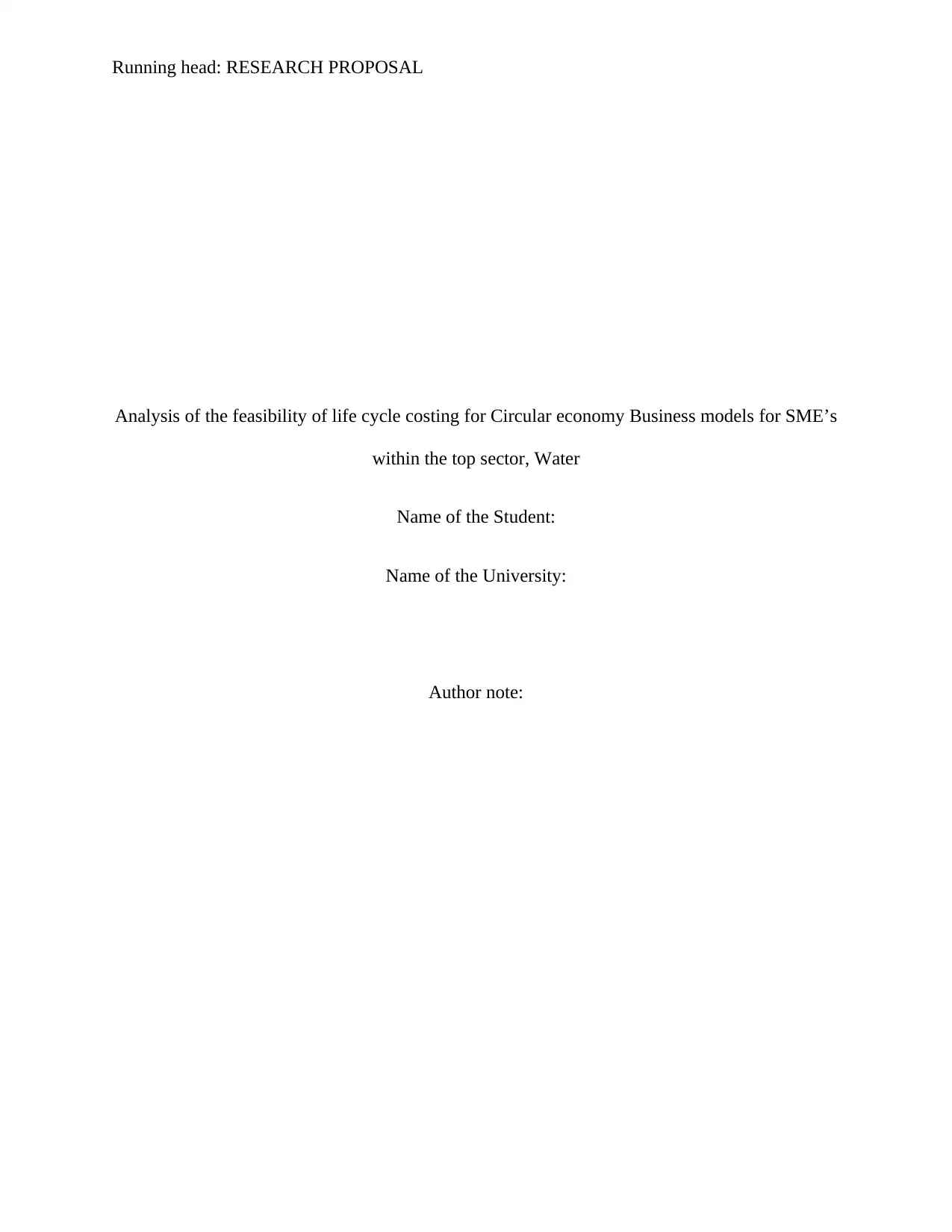
Running head: RESEARCH PROPOSAL
Analysis of the feasibility of life cycle costing for Circular economy Business models for SME’s
within the top sector, Water
Name of the Student:
Name of the University:
Author note:
Analysis of the feasibility of life cycle costing for Circular economy Business models for SME’s
within the top sector, Water
Name of the Student:
Name of the University:
Author note:
Paraphrase This Document
Need a fresh take? Get an instant paraphrase of this document with our AI Paraphraser
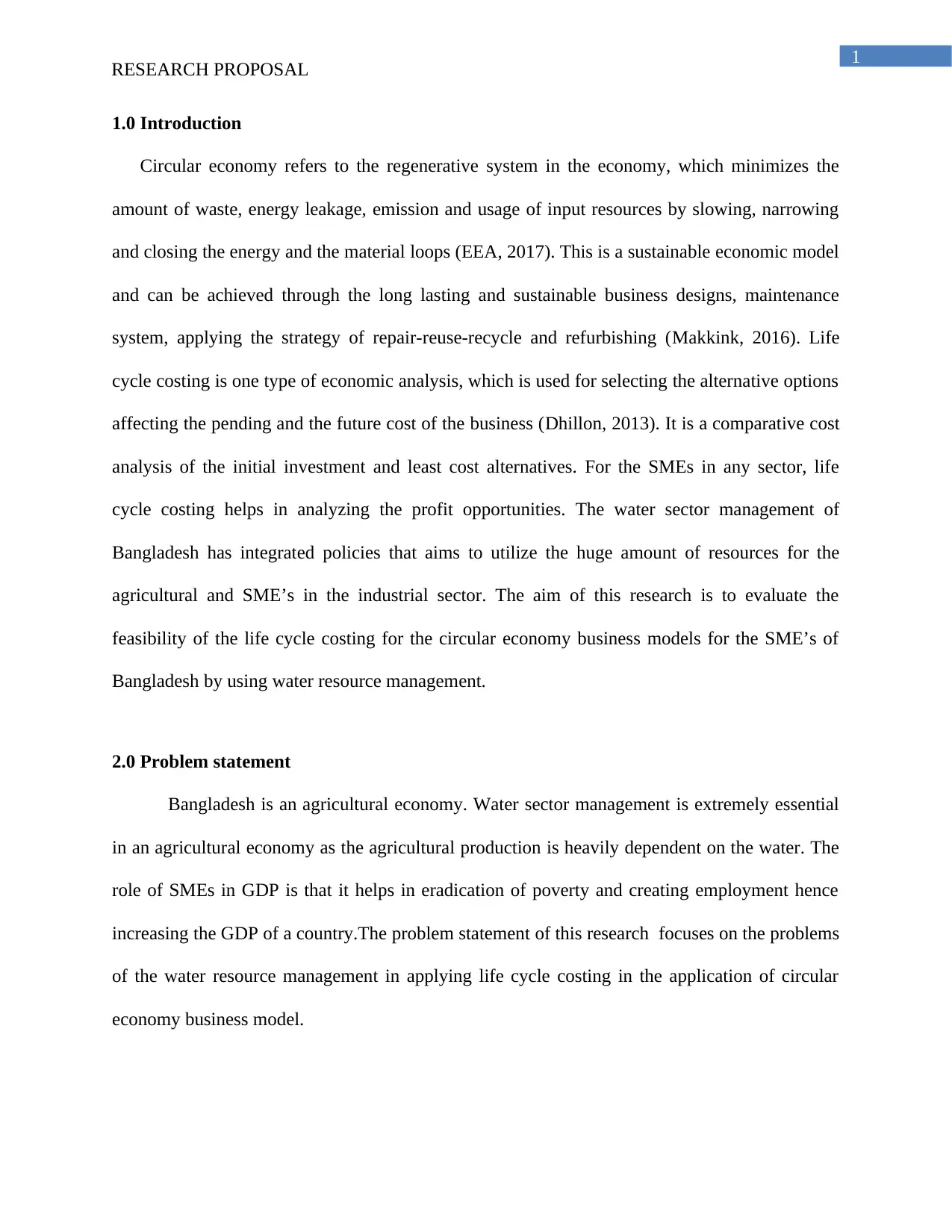
1
RESEARCH PROPOSAL
1.0 Introduction
Circular economy refers to the regenerative system in the economy, which minimizes the
amount of waste, energy leakage, emission and usage of input resources by slowing, narrowing
and closing the energy and the material loops (EEA, 2017). This is a sustainable economic model
and can be achieved through the long lasting and sustainable business designs, maintenance
system, applying the strategy of repair-reuse-recycle and refurbishing (Makkink, 2016). Life
cycle costing is one type of economic analysis, which is used for selecting the alternative options
affecting the pending and the future cost of the business (Dhillon, 2013). It is a comparative cost
analysis of the initial investment and least cost alternatives. For the SMEs in any sector, life
cycle costing helps in analyzing the profit opportunities. The water sector management of
Bangladesh has integrated policies that aims to utilize the huge amount of resources for the
agricultural and SME’s in the industrial sector. The aim of this research is to evaluate the
feasibility of the life cycle costing for the circular economy business models for the SME’s of
Bangladesh by using water resource management.
2.0 Problem statement
Bangladesh is an agricultural economy. Water sector management is extremely essential
in an agricultural economy as the agricultural production is heavily dependent on the water. The
role of SMEs in GDP is that it helps in eradication of poverty and creating employment hence
increasing the GDP of a country.The problem statement of this research focuses on the problems
of the water resource management in applying life cycle costing in the application of circular
economy business model.
RESEARCH PROPOSAL
1.0 Introduction
Circular economy refers to the regenerative system in the economy, which minimizes the
amount of waste, energy leakage, emission and usage of input resources by slowing, narrowing
and closing the energy and the material loops (EEA, 2017). This is a sustainable economic model
and can be achieved through the long lasting and sustainable business designs, maintenance
system, applying the strategy of repair-reuse-recycle and refurbishing (Makkink, 2016). Life
cycle costing is one type of economic analysis, which is used for selecting the alternative options
affecting the pending and the future cost of the business (Dhillon, 2013). It is a comparative cost
analysis of the initial investment and least cost alternatives. For the SMEs in any sector, life
cycle costing helps in analyzing the profit opportunities. The water sector management of
Bangladesh has integrated policies that aims to utilize the huge amount of resources for the
agricultural and SME’s in the industrial sector. The aim of this research is to evaluate the
feasibility of the life cycle costing for the circular economy business models for the SME’s of
Bangladesh by using water resource management.
2.0 Problem statement
Bangladesh is an agricultural economy. Water sector management is extremely essential
in an agricultural economy as the agricultural production is heavily dependent on the water. The
role of SMEs in GDP is that it helps in eradication of poverty and creating employment hence
increasing the GDP of a country.The problem statement of this research focuses on the problems
of the water resource management in applying life cycle costing in the application of circular
economy business model.
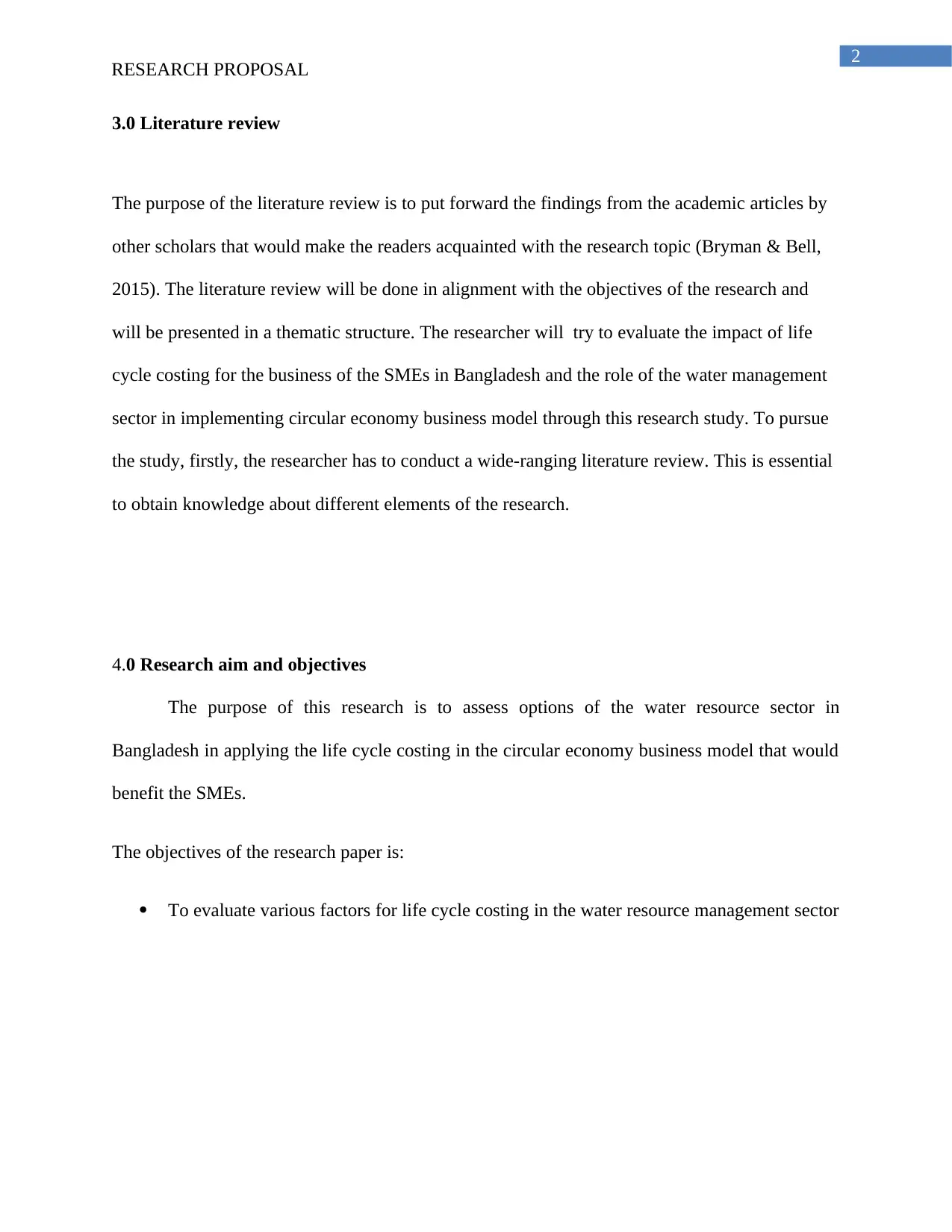
2
RESEARCH PROPOSAL
3.0 Literature review
The purpose of the literature review is to put forward the findings from the academic articles by
other scholars that would make the readers acquainted with the research topic (Bryman & Bell,
2015). The literature review will be done in alignment with the objectives of the research and
will be presented in a thematic structure. The researcher will try to evaluate the impact of life
cycle costing for the business of the SMEs in Bangladesh and the role of the water management
sector in implementing circular economy business model through this research study. To pursue
the study, firstly, the researcher has to conduct a wide-ranging literature review. This is essential
to obtain knowledge about different elements of the research.
4.0 Research aim and objectives
The purpose of this research is to assess options of the water resource sector in
Bangladesh in applying the life cycle costing in the circular economy business model that would
benefit the SMEs.
The objectives of the research paper is:
To evaluate various factors for life cycle costing in the water resource management sector
RESEARCH PROPOSAL
3.0 Literature review
The purpose of the literature review is to put forward the findings from the academic articles by
other scholars that would make the readers acquainted with the research topic (Bryman & Bell,
2015). The literature review will be done in alignment with the objectives of the research and
will be presented in a thematic structure. The researcher will try to evaluate the impact of life
cycle costing for the business of the SMEs in Bangladesh and the role of the water management
sector in implementing circular economy business model through this research study. To pursue
the study, firstly, the researcher has to conduct a wide-ranging literature review. This is essential
to obtain knowledge about different elements of the research.
4.0 Research aim and objectives
The purpose of this research is to assess options of the water resource sector in
Bangladesh in applying the life cycle costing in the circular economy business model that would
benefit the SMEs.
The objectives of the research paper is:
To evaluate various factors for life cycle costing in the water resource management sector
⊘ This is a preview!⊘
Do you want full access?
Subscribe today to unlock all pages.

Trusted by 1+ million students worldwide
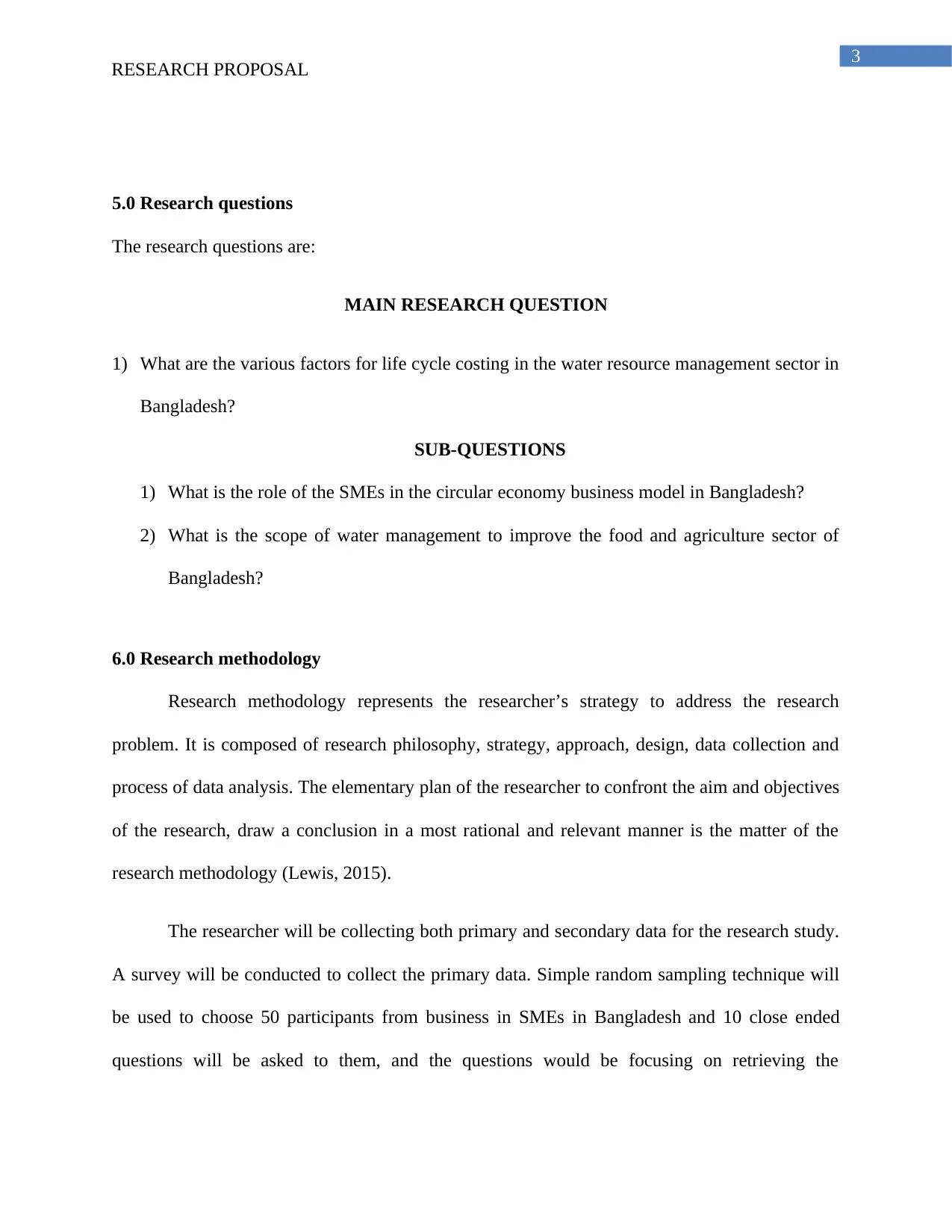
3
RESEARCH PROPOSAL
5.0 Research questions
The research questions are:
MAIN RESEARCH QUESTION
1) What are the various factors for life cycle costing in the water resource management sector in
Bangladesh?
SUB-QUESTIONS
1) What is the role of the SMEs in the circular economy business model in Bangladesh?
2) What is the scope of water management to improve the food and agriculture sector of
Bangladesh?
6.0 Research methodology
Research methodology represents the researcher’s strategy to address the research
problem. It is composed of research philosophy, strategy, approach, design, data collection and
process of data analysis. The elementary plan of the researcher to confront the aim and objectives
of the research, draw a conclusion in a most rational and relevant manner is the matter of the
research methodology (Lewis, 2015).
The researcher will be collecting both primary and secondary data for the research study.
A survey will be conducted to collect the primary data. Simple random sampling technique will
be used to choose 50 participants from business in SMEs in Bangladesh and 10 close ended
questions will be asked to them, and the questions would be focusing on retrieving the
RESEARCH PROPOSAL
5.0 Research questions
The research questions are:
MAIN RESEARCH QUESTION
1) What are the various factors for life cycle costing in the water resource management sector in
Bangladesh?
SUB-QUESTIONS
1) What is the role of the SMEs in the circular economy business model in Bangladesh?
2) What is the scope of water management to improve the food and agriculture sector of
Bangladesh?
6.0 Research methodology
Research methodology represents the researcher’s strategy to address the research
problem. It is composed of research philosophy, strategy, approach, design, data collection and
process of data analysis. The elementary plan of the researcher to confront the aim and objectives
of the research, draw a conclusion in a most rational and relevant manner is the matter of the
research methodology (Lewis, 2015).
The researcher will be collecting both primary and secondary data for the research study.
A survey will be conducted to collect the primary data. Simple random sampling technique will
be used to choose 50 participants from business in SMEs in Bangladesh and 10 close ended
questions will be asked to them, and the questions would be focusing on retrieving the
Paraphrase This Document
Need a fresh take? Get an instant paraphrase of this document with our AI Paraphraser
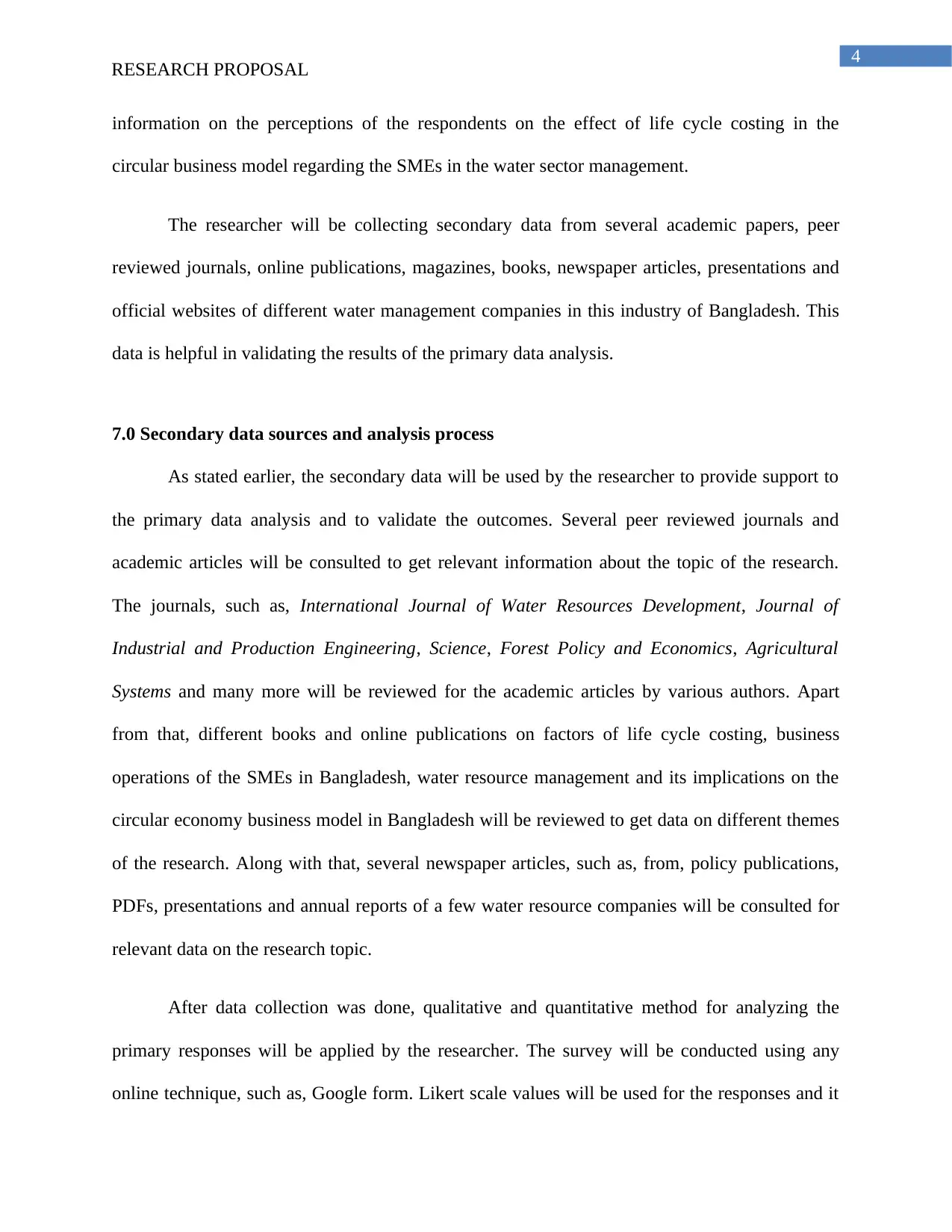
4
RESEARCH PROPOSAL
information on the perceptions of the respondents on the effect of life cycle costing in the
circular business model regarding the SMEs in the water sector management.
The researcher will be collecting secondary data from several academic papers, peer
reviewed journals, online publications, magazines, books, newspaper articles, presentations and
official websites of different water management companies in this industry of Bangladesh. This
data is helpful in validating the results of the primary data analysis.
7.0 Secondary data sources and analysis process
As stated earlier, the secondary data will be used by the researcher to provide support to
the primary data analysis and to validate the outcomes. Several peer reviewed journals and
academic articles will be consulted to get relevant information about the topic of the research.
The journals, such as, International Journal of Water Resources Development, Journal of
Industrial and Production Engineering, Science, Forest Policy and Economics, Agricultural
Systems and many more will be reviewed for the academic articles by various authors. Apart
from that, different books and online publications on factors of life cycle costing, business
operations of the SMEs in Bangladesh, water resource management and its implications on the
circular economy business model in Bangladesh will be reviewed to get data on different themes
of the research. Along with that, several newspaper articles, such as, from, policy publications,
PDFs, presentations and annual reports of a few water resource companies will be consulted for
relevant data on the research topic.
After data collection was done, qualitative and quantitative method for analyzing the
primary responses will be applied by the researcher. The survey will be conducted using any
online technique, such as, Google form. Likert scale values will be used for the responses and it
RESEARCH PROPOSAL
information on the perceptions of the respondents on the effect of life cycle costing in the
circular business model regarding the SMEs in the water sector management.
The researcher will be collecting secondary data from several academic papers, peer
reviewed journals, online publications, magazines, books, newspaper articles, presentations and
official websites of different water management companies in this industry of Bangladesh. This
data is helpful in validating the results of the primary data analysis.
7.0 Secondary data sources and analysis process
As stated earlier, the secondary data will be used by the researcher to provide support to
the primary data analysis and to validate the outcomes. Several peer reviewed journals and
academic articles will be consulted to get relevant information about the topic of the research.
The journals, such as, International Journal of Water Resources Development, Journal of
Industrial and Production Engineering, Science, Forest Policy and Economics, Agricultural
Systems and many more will be reviewed for the academic articles by various authors. Apart
from that, different books and online publications on factors of life cycle costing, business
operations of the SMEs in Bangladesh, water resource management and its implications on the
circular economy business model in Bangladesh will be reviewed to get data on different themes
of the research. Along with that, several newspaper articles, such as, from, policy publications,
PDFs, presentations and annual reports of a few water resource companies will be consulted for
relevant data on the research topic.
After data collection was done, qualitative and quantitative method for analyzing the
primary responses will be applied by the researcher. The survey will be conducted using any
online technique, such as, Google form. Likert scale values will be used for the responses and it
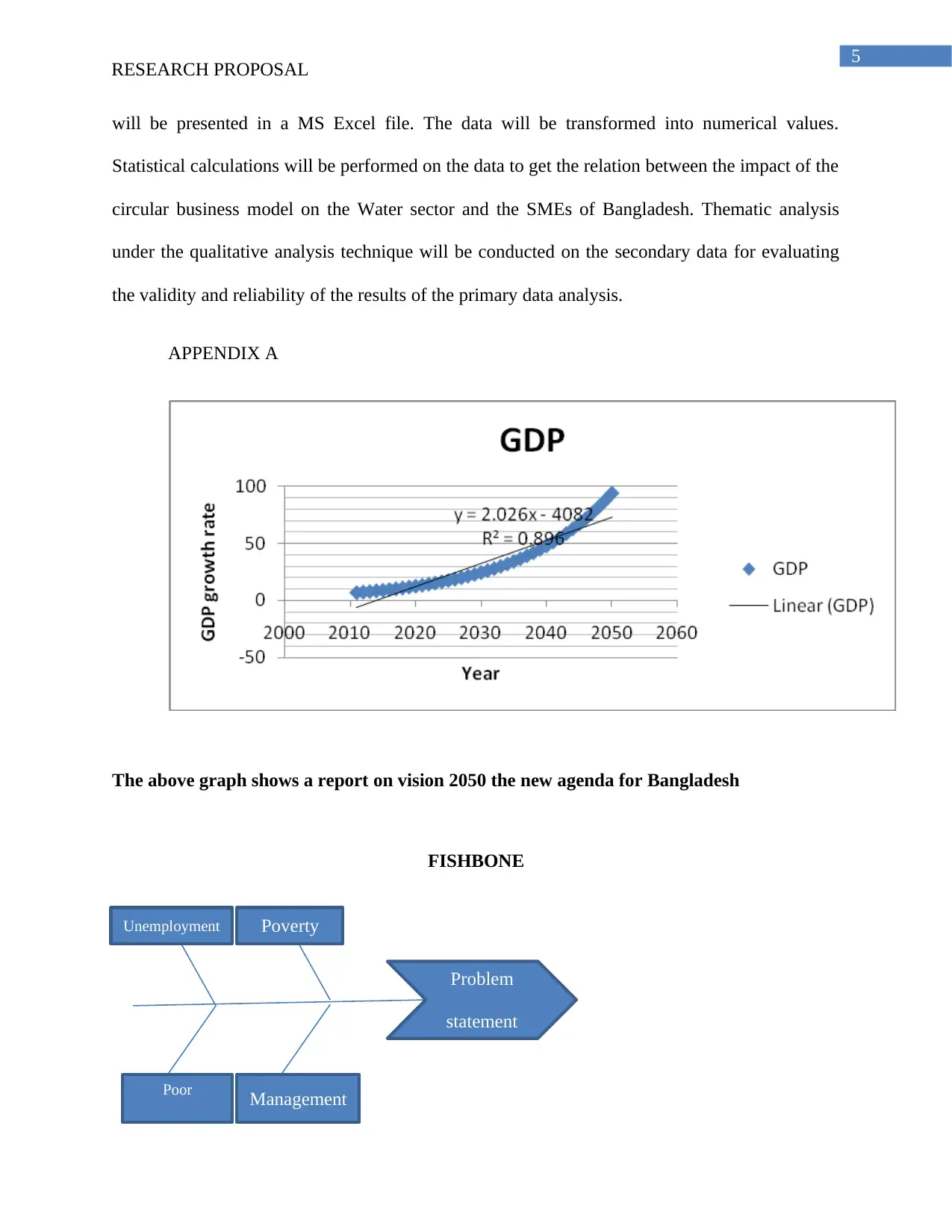
5
RESEARCH PROPOSAL
will be presented in a MS Excel file. The data will be transformed into numerical values.
Statistical calculations will be performed on the data to get the relation between the impact of the
circular business model on the Water sector and the SMEs of Bangladesh. Thematic analysis
under the qualitative analysis technique will be conducted on the secondary data for evaluating
the validity and reliability of the results of the primary data analysis.
APPENDIX A
The above graph shows a report on vision 2050 the new agenda for Bangladesh
FISHBONE
Problem
statement
Unemployment Poverty
Management
Poor
environment
RESEARCH PROPOSAL
will be presented in a MS Excel file. The data will be transformed into numerical values.
Statistical calculations will be performed on the data to get the relation between the impact of the
circular business model on the Water sector and the SMEs of Bangladesh. Thematic analysis
under the qualitative analysis technique will be conducted on the secondary data for evaluating
the validity and reliability of the results of the primary data analysis.
APPENDIX A
The above graph shows a report on vision 2050 the new agenda for Bangladesh
FISHBONE
Problem
statement
Unemployment Poverty
Management
Poor
environment
⊘ This is a preview!⊘
Do you want full access?
Subscribe today to unlock all pages.

Trusted by 1+ million students worldwide
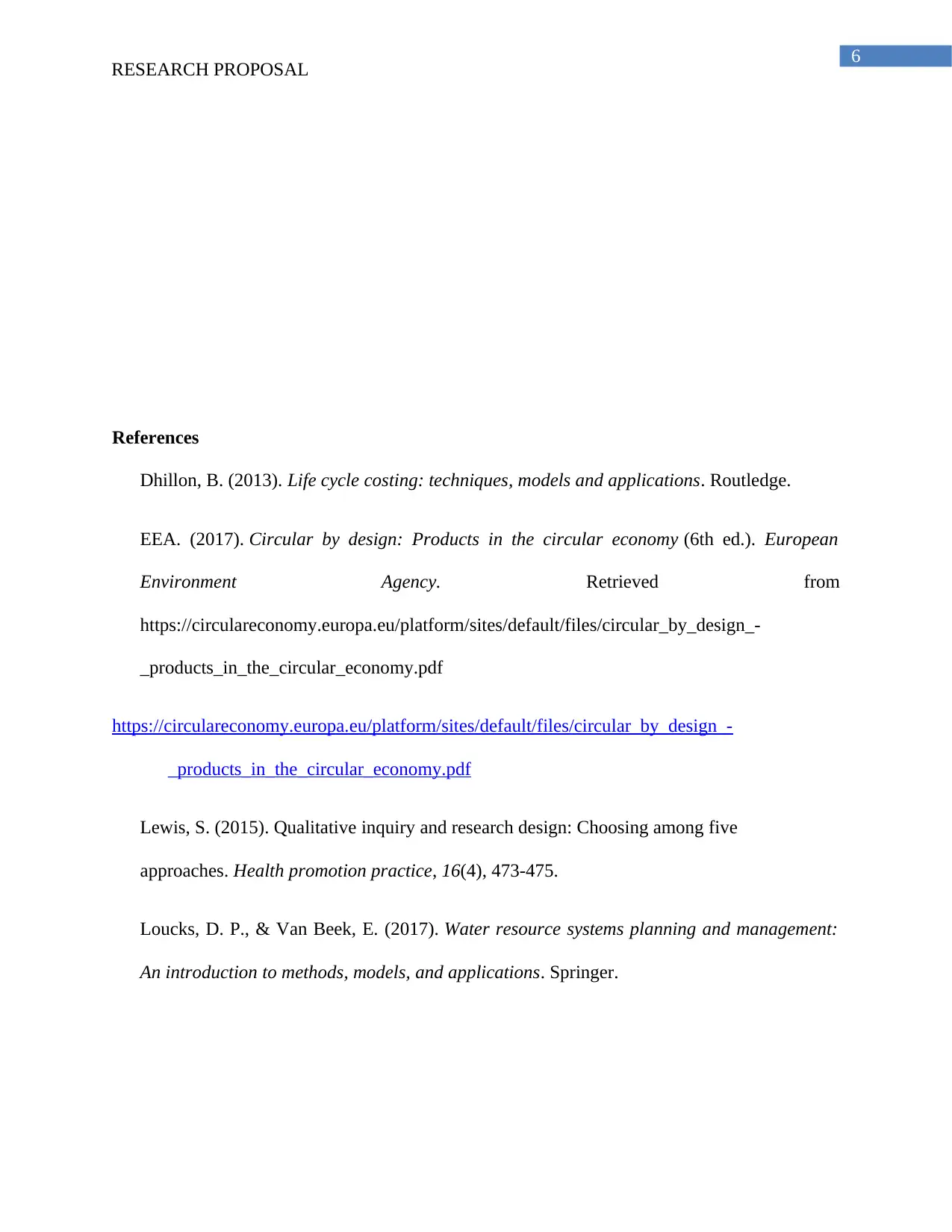
6
RESEARCH PROPOSAL
References
Dhillon, B. (2013). Life cycle costing: techniques, models and applications. Routledge.
EEA. (2017). Circular by design: Products in the circular economy (6th ed.). European
Environment Agency. Retrieved from
https://circulareconomy.europa.eu/platform/sites/default/files/circular_by_design_-
_products_in_the_circular_economy.pdf
https://circulareconomy.europa.eu/platform/sites/default/files/circular_by_design_-
_products_in_the_circular_economy.pdf
Lewis, S. (2015). Qualitative inquiry and research design: Choosing among five
approaches. Health promotion practice, 16(4), 473-475.
Loucks, D. P., & Van Beek, E. (2017). Water resource systems planning and management:
An introduction to methods, models, and applications. Springer.
RESEARCH PROPOSAL
References
Dhillon, B. (2013). Life cycle costing: techniques, models and applications. Routledge.
EEA. (2017). Circular by design: Products in the circular economy (6th ed.). European
Environment Agency. Retrieved from
https://circulareconomy.europa.eu/platform/sites/default/files/circular_by_design_-
_products_in_the_circular_economy.pdf
https://circulareconomy.europa.eu/platform/sites/default/files/circular_by_design_-
_products_in_the_circular_economy.pdf
Lewis, S. (2015). Qualitative inquiry and research design: Choosing among five
approaches. Health promotion practice, 16(4), 473-475.
Loucks, D. P., & Van Beek, E. (2017). Water resource systems planning and management:
An introduction to methods, models, and applications. Springer.
Paraphrase This Document
Need a fresh take? Get an instant paraphrase of this document with our AI Paraphraser
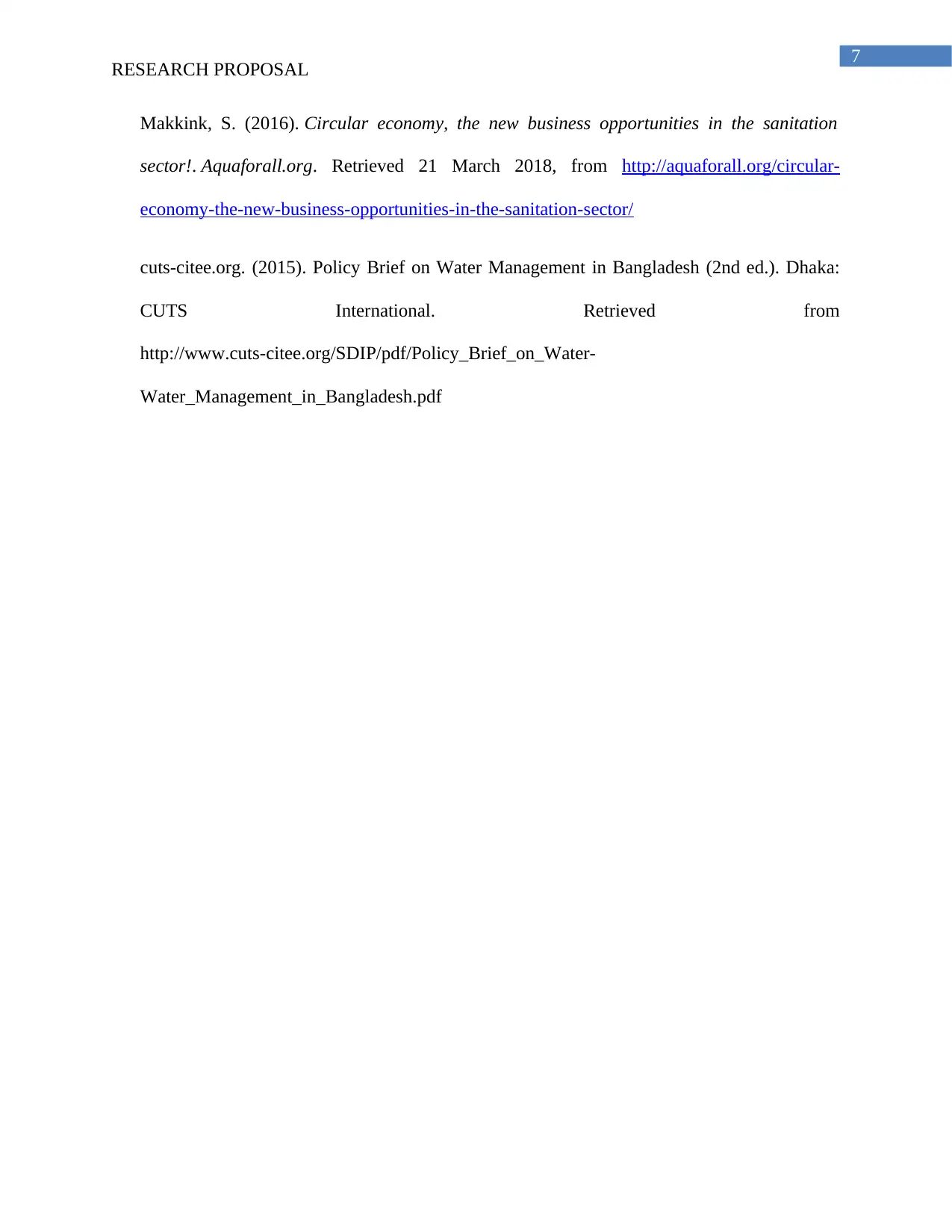
7
RESEARCH PROPOSAL
Makkink, S. (2016). Circular economy, the new business opportunities in the sanitation
sector!. Aquaforall.org. Retrieved 21 March 2018, from http://aquaforall.org/circular-
economy-the-new-business-opportunities-in-the-sanitation-sector/
cuts-citee.org. (2015). Policy Brief on Water Management in Bangladesh (2nd ed.). Dhaka:
CUTS International. Retrieved from
http://www.cuts-citee.org/SDIP/pdf/Policy_Brief_on_Water-
Water_Management_in_Bangladesh.pdf
RESEARCH PROPOSAL
Makkink, S. (2016). Circular economy, the new business opportunities in the sanitation
sector!. Aquaforall.org. Retrieved 21 March 2018, from http://aquaforall.org/circular-
economy-the-new-business-opportunities-in-the-sanitation-sector/
cuts-citee.org. (2015). Policy Brief on Water Management in Bangladesh (2nd ed.). Dhaka:
CUTS International. Retrieved from
http://www.cuts-citee.org/SDIP/pdf/Policy_Brief_on_Water-
Water_Management_in_Bangladesh.pdf
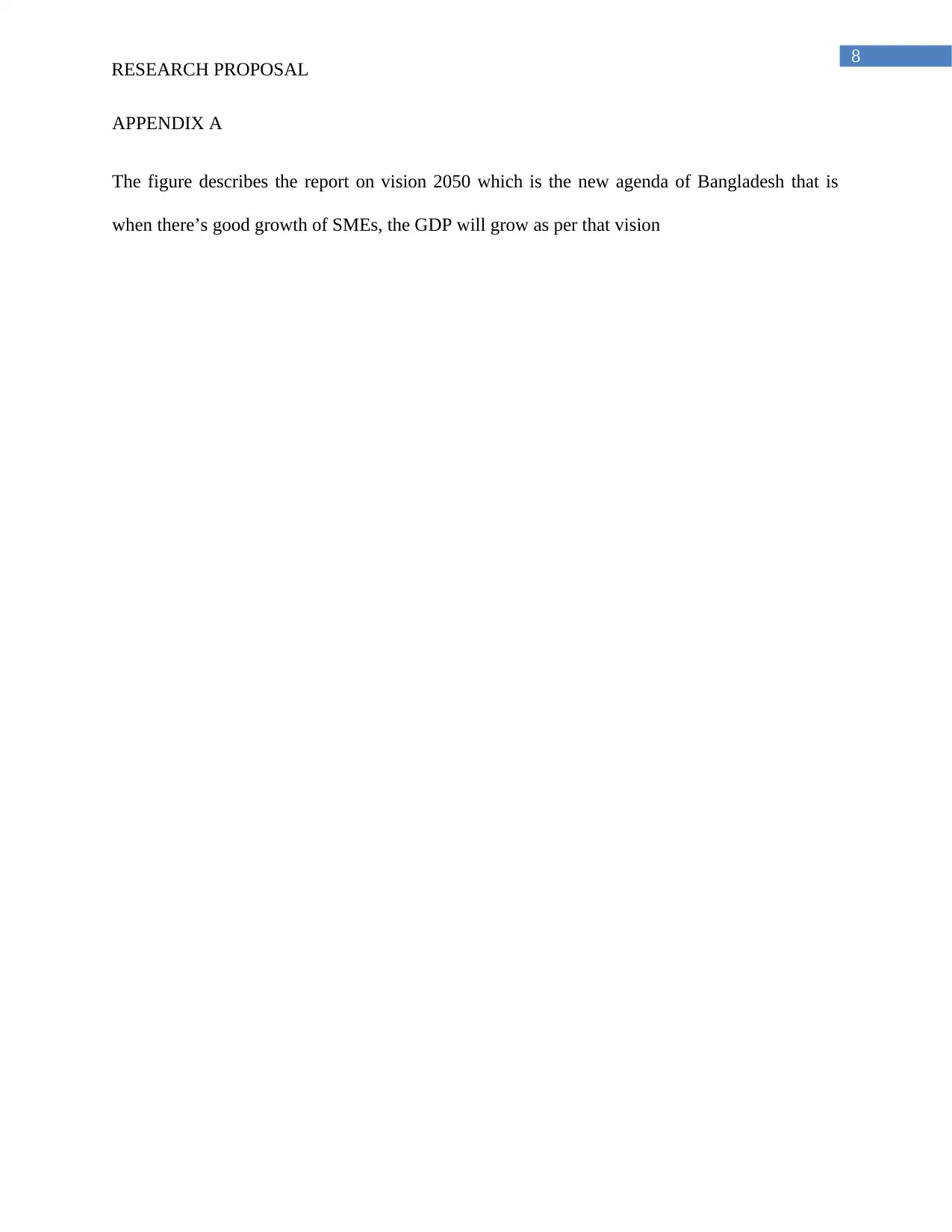
8
RESEARCH PROPOSAL
APPENDIX A
The figure describes the report on vision 2050 which is the new agenda of Bangladesh that is
when there’s good growth of SMEs, the GDP will grow as per that vision
RESEARCH PROPOSAL
APPENDIX A
The figure describes the report on vision 2050 which is the new agenda of Bangladesh that is
when there’s good growth of SMEs, the GDP will grow as per that vision
⊘ This is a preview!⊘
Do you want full access?
Subscribe today to unlock all pages.

Trusted by 1+ million students worldwide
1 out of 9
Related Documents
Your All-in-One AI-Powered Toolkit for Academic Success.
+13062052269
info@desklib.com
Available 24*7 on WhatsApp / Email
![[object Object]](/_next/static/media/star-bottom.7253800d.svg)
Unlock your academic potential
Copyright © 2020–2026 A2Z Services. All Rights Reserved. Developed and managed by ZUCOL.





